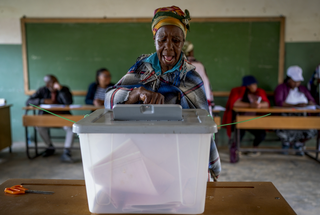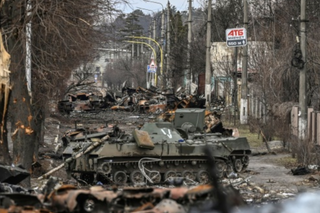News
Africa’s Political and Governance Systems are Facing a Legitimacy Crisis – Public Engagement is Essential
For many in Africa, the underbelly of democratic governance is that it is a cover-up for defending elite privilege and power rather than addressing the issues most pressing to the electorate.

Cobblestone floors embody a compelling duality: their aesthetic appeal exudes a timeless allure, yet their inherently treacherous nature demands cautious navigation.
It’s an exceptional thing to be able to admire the strange construction material and the artisanship required to put it together and, in the same breath, mouth a few choice words as one navigates the uneven nature of them, hoping desperately that a misstep doesn’t take you from a gleeful dame to an embarrassed damsel in distress. Navigating them requires measured enthusiasm.
And so is the case for encouraging a culture of public discourse in the quest for development. It’s a necessary but complex endeavour, requiring diligent engagement to foster progress and build a participatory social compact.
Like many, and for a good reason, it’s become exhausting talking about what needs to be done and not done. The reason we may all hate this idea is that it feels like a fruitless activity. There are no clear pathways to ensure that those who ought to listen will do so.
As such, advocating for a marketplace of ideas and encouraging less-politicised discourse on where we are, what we need and how to go about it feels like another fool’s errand.
Except it is not. A significant section of Africans, about one in seven, find politics and government too complicated for them to comprehend. In a world where people are disenchanted with governance and disengaging in ways that hinder achieving better countries and a better world, this indicates the need to make policy and the nuances of policymaking more “average-person-friendly”. We need to rethink how we foster national dialogue and build better response mechanisms around them. It is not for a select few.
Why? It is important for many reasons, not least that our existing political systems and governance structures are facing a legitimacy crisis. A culture of non-delivery, or subpar delivery where it occurs, has left many disinterested in organised governance, at least in the forms we have and express them now. This is manifesting in different ways, including at the polls.
In Nigeria, despite 93 million people registering to vote and going through the tedious process of collecting their PVCs, only a little more than 25 million voted. Yes, there are nuances around the fear and intimidation that characterised the election, but still, a turnout of under 30% leaves much to be desired.
Dr Chikodiri Nwangwu, a senior lecturer in the Department of Political Science at the University of Nigeria, says that key among the reasons is that “there was insufficient voter education. Many Nigerians don’t understand the benefits of political participation, or don’t understand the electoral process. Little effort is made to explain it to them.”
The core of the issue is a misunderstanding around, and disillusionment with, the outcomes of our democracy project as it is structured today.
The story is pretty similar elsewhere. On 7 October 2022, the southern African kingdom of Lesotho went to the polls, and turnout too stood at an all-time low of 38% of the registered voters, almost 10 percentage points below the 47% who voted in the last elections in 2017.
There, too, the belief is that “voters are tired of the old politicians and their unwillingness and inability to solve the pressing problems of poverty, crumbling infrastructure and social service underinvestment, according to John Aerni-Flessner, associate professor of African history at Michigan State University.
The same can be said of Kenya, where 2022’s election saw a drop in overall turnout at 64.6%, a significant reduction from previous elections: 78% in August 2017 and 86% in March 2013. Even more distinct was the decline in participation by those between 18 and 35 years old. Compared with 2017, 5.27% less registered to vote in 2022.
In a report by The Africa Report, Benson Wakoli, a 24-year-old employee at a small telephone shop in downtown Nairobi, was among those who did not register to vote: “I can’t waste my time and vote for people who keep on lying to us.”
This highlights the failure of governance on the continent and is an indictment of Africa’s leaders.
Indeed, while there may very well be a host of different reasons for the increasing voter apathy, it is crucial to acknowledge that none of them is good. The core of the issue is a misunderstanding around, and disillusionment with, the outcomes of our democracy project as it is structured today.
Getting public discourse right will not be easy because issues around polarisation, echo chambers and hypocrisy will need to be addressed.
For many, it has failed to deliver the basics such as crucial public services, where water, health and education are not inexpensive, easily accessible and are still of low quality, and where infrastructure is sparse and inefficient and available only to a lucky minority of the population.
For many, the underbelly of democratic governance is characterised by what by renowned Ghanaian political scientist and co-founder of the Afrobarometer, Professor E Gyimah-Boadi describes as “toxicity, dysfunction, corruption and zero-sum/winner-takes-all politics that enables a narrow group (mainly party elites and close allies in the domestic private sector) to co-opt, corrupt or pervert the nature of democratic institutions (and processes) to impose policies that work towards maintaining their privileged status”.
In essence, it is a cover-up for defending elite privilege and power rather than addressing the issues most pressing to the electorate.
In reviewing the Ghanaian case, Gyimah-Boadi found that “four in 10 Ghanaians seemed to deny their own agency as citizens, as they saw government like a parent rather than their agent”.
It is unsurprising then that, although better than the seventh round of surveys, passive forms of civic participation dominate, where only half of the people surveyed indicated ever joining others to raise an issue in the past year. This status quo, in Ghana as it is elsewhere on the continent, forms the basis of the absence of bottom-up demand for accountability, as Gyimah-Boadi writes, and the unfathomable tolerance of government underperformance and incompetence in the provision of public services.
Solutions from open dialogue
Of course, conditions are far worse in authoritarian states where repression and a lack of delivery are pervasive, but there are higher expectations of a democracy.

By creating and facilitating avenues for productive discourse, people can better understand what good choices should and could look like, the trade-offs involved in making certain decisions, what it means to demand better, and how to hold leaders accountable.
It goes without saying that when diverse stakeholders engage in open dialogue, innovative solutions have a better chance of emerging, leading to more effective policies and governance. Noteworthy, too, are the feedback, trust and accountability mechanisms that will arise between elected officials and the electorate.
Encouraging public discourse can thus be very beneficial, especially as it pertains to meeting the electorate’s needs. There are many ways to do this, including:
- Strengthening civic education: to increase citizen understanding of their rights and obligations and the value of active engagement, civic education efforts must be promoted locally. Residents can learn about municipal governance structures, decision-making procedures and possibilities for public involvement through workshops, community dialogues and awareness campaigns;
- Creating platforms for community engagement: creating inclusive platforms for people to express their views and engage in discussions is crucial. Ensuring that subnational leaders establish community forums, town hall meetings and neighbourhood assemblies provides opportunities for citizens to come together, identify shared problems, voice their concerns, generate solutions and actively and collectively advocate for those solutions;
- Enhancing transparency and access to information: these are essential for practical public discourse. Local government should prioritise, and citizens must demand transparency by sharing information on budget allocations, projects and decision-making processes. A habit of publishing reports and making information easily accessible – using technology, for instance, can empower citizens to engage in informed discussions and hold local authorities to account;
- Strengthening media and communication: local media play a vital role in fostering public discourse. Collaborating with local radio stations, community newspapers and online platforms to provide space for discussions, debates and interviews can amplify local voices and promote a culture of public engagement. Local government authorities should also engage with media outlets to share information, respond to queries and facilitate meaningful conversations; and
- Engaging local leaders: at the local level, traditional and opinion leaders have tremendous sway. By drawing on their knowledge, experience and networks, chiefs, elders, religious leaders and opinion leaders can help foster public discourse. Collaborating with these influential figures to organise community dialogues, promote participatory decision-making and encourage open discussions can help boost civic participation and, more importantly, build strong, independent institutions that can call out government failures.
Getting public discourse right will not be easy because issues around polarisation, echo chambers and hypocrisy will need to be addressed. It is, however, important to note that while these points provide a counterargument against public discourse, they do not negate the overall importance and value of open dialogue.
The challenges raised can be addressed by promoting responsible discourse and fact-checking mechanisms, and ensuring diverse participation while focusing on the common good, all of which an activated civil society can do.
Given the disillusionment with democracy and the dividend it has provided, or not, encouraging dialogue may very well aid in rebuilding trust and allowing accountability in our governance systems.
Public discourse as a civic engagement tool has helped in places. Sweden’s social welfare model, often praised for affording its citizens the “luxuries” of basic service provision, emerged from years of public discourse, resulting in a system that promotes equality and social cohesion.
The same can be found with Germany’s “Energiewende” transition to renewable energy, another project driven by widespread public debate and consensus-building.
These examples highlight the immense impact that public discourse can have on developing more inclusive policies, securing buy-in, shaping economic development policies and improving civic participation. Hard stuff but beautiful results nevertheless.
This article originally appeared on the Daily Maverick
Photo: Shiraaz Mohamed


